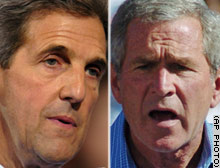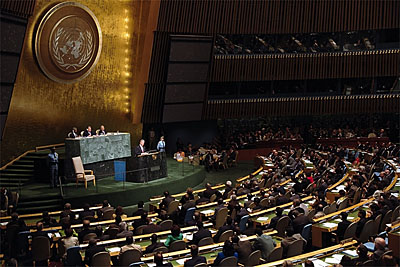During the late unpleasantness, in spite of a sharply divided electorate and sharply worded debate, there was one point of agreement that you could always count on. To illustrate, here’s George Bush, trying to lay the smack down on Kerry:
When our country is in danger, it is not the job of the president
to take an international poll; it’s to defend our country.
And here’s John Kerry doing his best to sidestep the smack down by insisting that he agrees with Bush on the principle:
What I said in the sentence preceding that was, I will never
cede America’s security to any institution or any other
country.
No one gets a veto over our security. No one.
Of course, Bush and Kerry disagree over something here: they disagree over what Kerry’s position is. But of course that disagreement reveals a fundamental agreement between the two: both of them accept the underlying premise that it would be absolutely damning for a Presidential candidate to tie decision-making about when and where the American military is deployed to another country or an international body. In fact, this is a point of political dogma repeated endlessly by almost everyone who has anything at all to say about the matter. Here’s William Saletan in Slate:
It’s clear from Kerry’s first sentence that the “global test”
doesn’t prevent unilateral action to protect ourselves. But notice
what else Kerry says. The test includes convincing “your
countrymen” that your reasons are clear and sound.
And here’s Dick Cheney, direct as ever:
We heard Senator Kerry say the other night that there ought to be
some kind of global test before U.S. troops are deployed
preemptively to protect the United States. That’s part of a track
record that goes back to the 1970s when he ran for Congress the
first time and said troops should not be deployed without U.N.
approval.
Now, I think that the Right is obviously wrong on the exegetical question of what Kerry actually said and believes, but I won’t belabor the point here (if you want it belabored, I suggest Roderick’s discussion at Austro-Athenian Empire). Let’s take it for granted that neither Bush nor Kerry would give another country a veto over American security policy, and move on to the critical question: do they have legitimate grounds for refusing to do so?
You’d take it from the way the debate has gone that it’s self-evident that they do: everyone in the droning classes seems to take it for granted that no sane governor could reasonably think that you ought to give other countries a veto over American security policy. Yet both Bush and Kerry were running for President–an office whose legal authority is supposed to derive from the Constitution of the United States. And the Constitution (which you swear to uphold when you become President) says, inter alia, that
This Constitution, and the laws of the United States which shall be
made in pursuance thereof; and all treaties made, or which
shall be made, under the authority of the United States,
shall be the supreme law of the land; and the judges in every state
shall be bound thereby, anything in the Constitution or laws of any
State to the contrary notwithstanding. (Article VI, emphasis
added)
One of those treaties made under the authority of the United States is the Charter of the United Nations, which was ratified by the United States government in 1945. If you accept the Constitution as legally binding, then you have to accept the provisions of the United Nations charter as legally binding; and among those provisions are:
Article 2
…
§ 2. All Members, in order to ensure to all of them the rights
and benefits resulting from membership, shall fulfill in good faith
the obligations assumed by them in accordance with the present
Charter.
§ 3. All Members shall settle their international
disputes by peaceful means in such a manner that international
peace and security, and justice, are not endangered.
§ 4. All Members shall refrain in their international
relations from the threat or use of force against the territorial
integrity or political independence of any state, or in any other
manner inconsistent with the Purposes of the United
Nations.
…
Article 33
§ 1. The parties to any dispute, the continuance of which is
likely to endanger the maintenance of international peace and
security, shall, first of all, seek a solution by negotiation,
enquiry, mediation, conciliation, arbitration, judicial settlement,
resort to regional agencies or arrangements, or other peaceful
means of their own choice.
§ 2. The Security Council shall, when it deems
necessary, call upon the parties to settle their dispute by such
means.
…
Article 39
The Security Council shall determine the existence of any threat to
the peace, breach of the peace, or act of aggression and shall make
recommendations, or decide what measures shall be taken in
accordance with Articles 41 and 42, to maintain or restore
international peace and security.
Article 40
In order to prevent an aggravation of the situation, the
Security Council may, before making the recommendations or
deciding upon the measures provided for in Article 39, call
upon the parties concerned to comply with such provisional measures
as it deems necessary or desirable. … The Security
Council shall duly take account of failure to comply with such
provisional measures.
Both Bush and Kerry claim to recognize the legal authority of the Constitution and the treaties made under it, including the U.N. Charter. But the plain text of the U.N. Charter gives other countries a veto over U.S. military policy, through the apparatus of the United Nations. Except in cases of actual invasion (which are exempted Article 51), the United States government cannot go to war without U.N. approval without violating the U.N Charter, and thus also the Constitution.
Now, as an anarchist, I don’t have a dog in this fight. I couldn’t care less about the United Nations: I’d argue that trusting a body constituted by the world’s heads of state and their representatives to protect international peace and human rights is about as wise as trusting a League of Foxes to guard the hen-house (and for precisely the same reasons). For that matter, I don’t recognize the legal authority of the Constitution and I don’t think that the pretenders to government office have any legitimate authority to ensnare the rest of us in legally binding treaties. But I do care about bad arguments. If there’s anyone who doesn’t agree with my peculiar views on the nature of legal authority, it’s John F. Kerry and George W. Bush; they claim to recognize the Constitution as legitimate and either one would swear to uphold it after being elected. If they really believe what they claim to believe about the law, then a decent sense of intellectual shame would demand that they either:
… accept other countries’ veto power over the United States’ decisions to go to war,
… move to formally withdraw the United States from the United Nations, or
… stop claiming that the Constitution is the basis for their legal authority
Something’s got to give; you can’t hold all the positions that John Kerry and George Bush loudly insisted that they hold without getting yourself stuck in a rank inconsistency. It may be too much to expect intellectual decency from politicians and political discourse. But if political discourse has lost its sense of shame, then the sooner it learns it again, the better. And someone has got to start the teaching, by example.
As the French might say, écrassez l’inf?@c3;a2;me.



